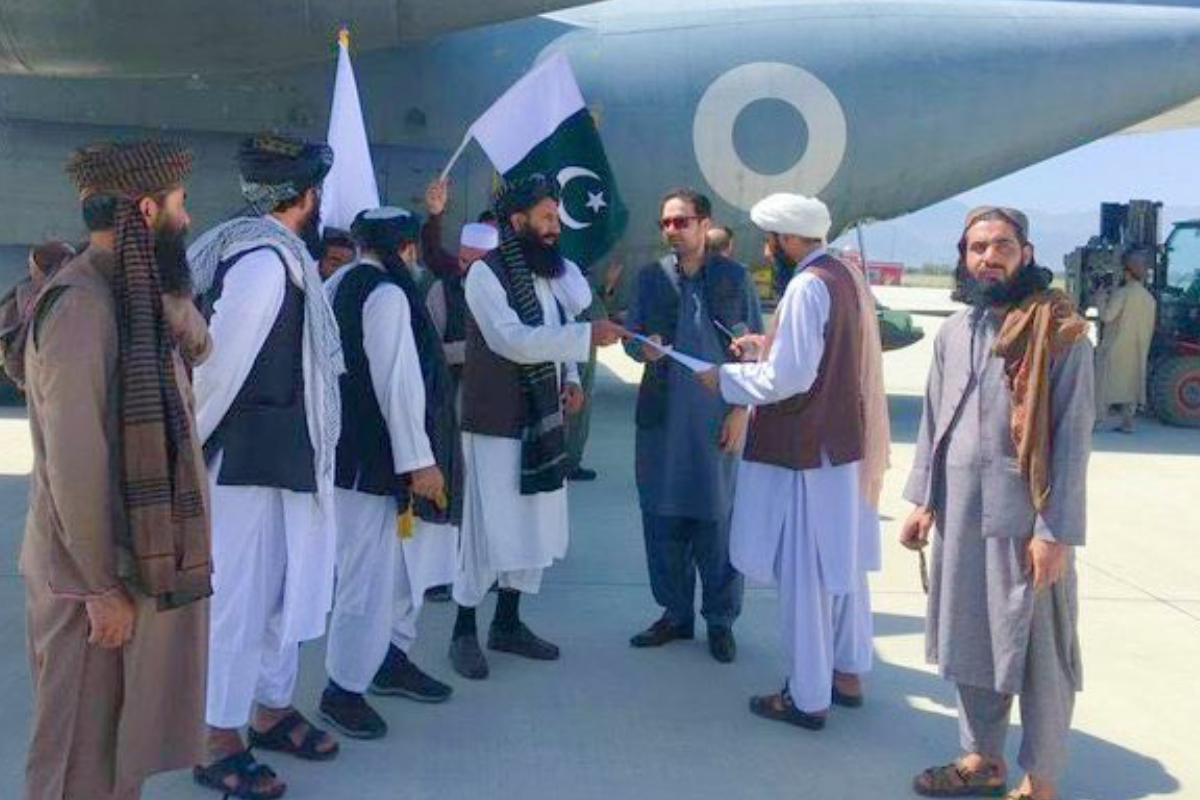Trouble is brewing in Pakistan’s ‘nefarious paradise’ with the Taliban as the terror group mocked the country with a picture of its surrender to India in the Liberation War of Bangladesh in 1971.
Ahmad Yasir, a Doha-based leader of the Taliban, tweeted the historic pictures that show Pakistan’s Lieutenant General Amir Abdullah Khan Niazi signing the instrument of surrender in Dhaka in the presence of General Officer Commanding-in-Chief Eastern Command Lieutenant General Jagjit Singh Aurora in 1971.
Along with the picture, Yasir tweeted, “Interior Minister of Pakistan! Excellent Sir! Afghanistan, Syria and Pakistan are not Turkey to target the Kurds in Syria. This is Afghanistan, the graveyard of proud empires. Do not think of a military attack on us, otherwise, there will be a shameful repetition of the military agreement with India.”
The tweet followed Pakistani interior minister Rana Sanaullah’s threatening statement about carrying out a military strike against the Tehreek-e-Taliban Pakistan (TTP)’s hideouts inside Afghanistan.
The Islamabad-Kabul relations are in shambles due to the Taliban’s relations with TTP, which Pakistan recognised as a terror organisation.
TTP, popular as Pakistan Taliban, last week killed at least six security forces of Pakistan in the restive province of Balochistan. The Friendship Gate at the Afghan-Pakistan Chaman border was closed due to attacks by TTP in which several Pakistanis died.
The Taliban, which was espoused by Pakistan, has always expressed its eagerness to be a mediator between Pakistan’s administration and TTP.
Despite top leadership, on both sides, trying to mitigate the TTP issue and Durand Line demarcation dispute, relations between Kabul and Islamabad are reported to be under strain – mostly due to Pakistan’s gradual loss of control over the terror groups.
د پاکستان داخله وزیر ته !
عالي جنابه! افغانستان سوريه او پاکستان ترکیه نده چې کردان په سوریه کې په نښه کړي.
دا افغانستان دى د مغرورو امپراتوريو هديره.
په مونږ دنظامي يرغل سوچ مه کړه کنه دهند سره دکړې نظامي معاهدې د شرم تکرار به وي داخاوره مالک لري هغه چې ستا بادار يې په ګونډو کړ. pic.twitter.com/FFu8DyBgio— Ahmad Yasir (@AhmadYasir711) January 2, 2023
Pakistan’s Interior Minister Rana Sanaullah recently said that there would be 7,000 to 10,000 fighters of the banned outfit TTP in the Pakistan-Afghanistan border area.
Speaking to The New Indian on Ahmad Yasir’s tweet, a pro-democracy supporter and Afghan citizen, Malalay Rahmanzai, said, “The strategy established by the Pakistani ISI is a strategy to make Afghanistan continuously destabilized. A destabilised country makes sure Pakistan can achieve its strategic depth in Afghanistan by bouncing back inside Afghanistan if it loses against India.”
“Strategic depth via Taliban and any other Islamist group means it can control the country and use it geo economically and geopolitically and geostrategically as they have done for the last 40 years,” Rahmanzai stated from Omaha, United States.
“Economically, Pakistan benefits from the aid from the West and the Gulf States and Western-backed institutions such as the IMF. It also benefits from the Taliban’s narco business and mineral business,” she said.
“Pakistan also benefitted from UN humanitarian assistance from Afghanistan and other methods like flights, visas, and exports,” she added.
Talking about geostrategic benefits, Rahmanzai said, “Pakistan benefits from its location by capitalising on Afghan territory and collaborating with Central Asian states and Western states that are concerned with terrorism and humanitarian conditions.”
“Geopolitically, it makes an irrelevant state relevant. Pakistan’s engagement with the West and Muslim states has increased a lot and the majority of the conversations are about Afghanistan,” Rahmanzai added.
Chris Blackburn, Head of European Outreach at Global Friends of Afghanistan, told The New Indian that Pakistan is reaping what it has sown.
“It used terrorism as state policy, thinking it was immune from the repercussions. Now, the Taliban have even run out of patience with their Pakistani masters. They see all the chicanery,” Blackburn said.
“It’s not surprising that the Taliban are starting to openly mock the Pakistani state. Islamabad and Rawalpindi deserve it. The unfortunate Afghan people caught in the crossfire,” he said.
Speaking further on the differences between Pakistan’s policy toward the Taliban and the TTP, the UK-based Afghan observer said, “Pakistan’s policy with the TTP is different from the Taliban because the former is pushing the state in Pakistan. If the Taliban were to back the TTP against Pakistan, there is likely to be a return to full military rule. Imran Khan is likely to come back to power as an Oliver Cromwell-type figure or Zia-ul Haq 2.0.”










